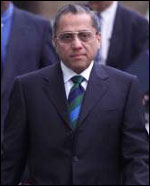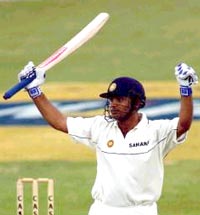 Home > Cricket > Diary archives
Home > Cricket > Diary archivesDecember 1, 2001
Happy endings!
Prem Panicker
I've spent a good part of the morning examining, with considerable bemusement, the contents of my mailbox.
A majority of the readers writing in with their thoughts on the Mike Denness controversy, and its resolution, have waxed wrathful about the injustice meted out to Virender Sehwag, who will now sit out two Test matches where he was only banned for one.
And quite a few of those readers have then gone on to deduce that by agreeing to this, the BCCI, in the person of Jagmohan Dalmiya, sold a principle for 12 pieces of silver.
Strange -- I had anticipated that the response to the denouement would have been a lot more positive.
I suspect that quite a few of those who have flooded the mailbox have spent far too much time reading some of the stuff put out by the international media. The headlines speak for themselves: 'India back down over Sehwag'; 'ICC wins battle against Dalmiya', et al.
It's easy enough to read such headlines, and accompanying stories, and get into a towering rage and want to go out into the streets and burn Dalmiya in effigy -- but it would be far more productive to take a deep breath or ten, and spend some time in thought.
Could we go back in time a bit, to November 19, when it all began, and ask ourselves one question -- when we picked a fight with the ICC, what precisely were we fighting for?
Not the ban on Sehwag -- that was a symptom. Not the fact that Tendulkar was deemed guilty of ball tampering -- that was another symptom. Not the blanket action taken against six players of one team in one shot -- that, like the other two, was the fever that indicated that we had a disease to treat.
The disease -- and the real reason for the big battle -- was the fact that down the years, umpires and match referees have been consistently inconsistent. That down the years, some teams have regularly got it in the neck while others have gotten away with murder. That the absence of a review procedure for match referees meant that those officials could get away with murder -- and over the years, the likes of Barry Jarman (vide the Allan Donald-Rahul Dravid imbroglio), Cammie Smith (vide Michael Slater et al) and now Mike Denness, have in fact got away with cricketing murder.
 Remember what the Indian stand was then? We asked that Mike Denness be stood down as match referee for the third Test. We asked that alternately, Denness's decisions be reviewed by a panel, and we said that we would abide by whatever decision the panel took.
Remember what the Indian stand was then? We asked that Mike Denness be stood down as match referee for the third Test. We asked that alternately, Denness's decisions be reviewed by a panel, and we said that we would abide by whatever decision the panel took.
The ICC, at the time, climbed on a high horse and said two things -- one, Denness would not be stood down and two, there would be no review whatsoever of his decisions. Further, it said that there was no provision for such reviews, that the authority of the match referee had to be seen as paramount, that to have a review panel sitting in judgement on the match referee would be counter-productive.
Well, well, what do you know, the ICC now says that Denness's decisions will in fact be reviewed.
That was the first part of the Indian battle -- and judging by facts, as opposed to the clever spins being given to them, I'd think that India appears to have won that round pretty handily, and got exactly what it asked for in the first place.
That, meanwhile, was the backbone of a larger battle -- to force the game's governing body to rethink the whole system of match referees, to iron out the system, plug loopholes, and ensure that such blatant injustice never occurs again -- not just to India, but to any team playing the game.
Again, what do you know -- the ICC now says that the system of match referees will be reviewed, and the need for a review panel will be discussed and if found necessary, will be implemented.
Again, that to me sounds like India won exactly what it was fighting for. The battle, of course, is far from over -- it is now up to the Indian board to take the lead on an issue of crucial importance, drum up support for its stand that the match referee system needs an overhaul, and push the decision through in the next ICC executive meeting.
If the BCCI does manage to do that, it can accept universal kudos for having rendered the game a big service.
That, then, is the fact of the matter -- India asked that Denness's decisions be reviewed. That request has been granted. India asked that the system of match referees and the rules governing their actions be revamped -- and the ICC has agreed to do that.
So what precisely is the heartburn all about? Why are we letting half-baked comments in some sections of the media light fires under us?
Two peripheral issues remain to be addressed -- and one is the question of whether Sachin Tendulkar did in fact tamper with the ball.
The match referee in question categorically says he did not. The umpires who stood in the match say they saw nothing wrong with the ball. The ICC clarifies that Tendulkar was punished for a technical fault -- to wit, he did not take the umpire's permission before cleaning the seam.
Fair enough -- cleaning the seam is not ball-tampering, but the rules say you need to check with the umpires before doing it and if Tendulkar did not take the required permission, he was at fault and has now been punished. Even this is being reviewed, but let's leave that lie for now. Let us, too, not ask what Kallis did on November 20, what Craig McMillan did on November 21, and such -- let's say, okay, Tendulkar was at fault, if only technically, and move on. The time to ask questions is when, and if, ICC match referees don't show the same zeal in enforcing this law here on in.
The other issue relates to that of Virender Sehwag. Again, it is time to stop reacting to the rubbish being written in some quarters, and see the issue for what it is.
The BCCI, throughout this controversy, used one sentence over and over again, to spell out its stance in re Sehwag. To wit: "As far as the BCCI is concerned, Sehwag is eligible for selection."
 It was assumed universally that this meant that Sehwag would play in Mohali. And the condemnations flowed thick and fast. Pundits wrote reams about the need for India to see reason, to refrain from picking Sehwag, to put the welfare of cricket above all else.
It was assumed universally that this meant that Sehwag would play in Mohali. And the condemnations flowed thick and fast. Pundits wrote reams about the need for India to see reason, to refrain from picking Sehwag, to put the welfare of cricket above all else.
The Indian board, after getting its major demands conceeded, had no reason any more to stick to its defiant stand on the Sehwag issue, and so agreed not to pick him for the first Test. Lo, the same pundits now see that as a climb-down.
Fine -- but why on earth would we need to spare a thought for that body of opinion?
It would have been downright stupid to have played Sehwag at Mohali. The outcome of such a move would have been, first, that the Test would have been declared unofficial; second, that the England tour would have been called off; third, that the ICC would have had an excuse to ban India for a period of time.
How precisely does this help either Sehwag, or India, or the game of cricket?
Personally, I've been amused by how Dalmiya and the BCCI, by using the name Sehwag as some kind of incantation, have managed to get the ICC to do precisely what it wanted that body to do all along. Two days ago, I remember writing in an article that Sehwag would not play in Mohali. The ICC, apparently, wasn't quite as clued in to what the BCCI was up to -- and therefore, it backed off, agreed to the two major points on the Indian agenda and in return, the BCCI promised not to do something it had no intention of doing anyway.
That leaves the question of Sehwag the player. Who has sat out one game -- which we at this point do not know whether it will become official or no. And will now sit out another game, which is official.
His net loss, thus, is one game. And Dalmiya -- acting with some heart, for once -- not only called the player up to explain the BCCI's decision to him (when last did the board ever show concern for the feelings of a player?), but also promised that he would be compensated for the monetary loss.
That leaves only the question of cricketing loss. Ask yourselves this -- if you were Sehwag, would you rather be remembered as the guy who copped an unjust punishment and thereby, forced a review of certain laws that went against the principles of natural justice? Or would you rather go down in history as the guy who was responsible, by his presence on a cricket field, for getting a series cancelled and even, perhaps, getting his country banned from the sport?
And finally, ask yourself this: If, on November 19, the ICC had responded positively to the BCCI's request that the decisions of Mike Denness be reviewed (and remember, that is all India ever asked for), would the game, and its fans, have been subjected to a week of needless strife, of turmoil, of unrelieved ugliness?
The ICC now agrees to such a review -- so what on earth was it fussing about all this while?
The Rediff Diary -- the complete archives
![]()
![]()
Email : Prem Panicker/Faisal Shariff
©1996 to 2001 rediff.com India Limited. All Rights Reserved.